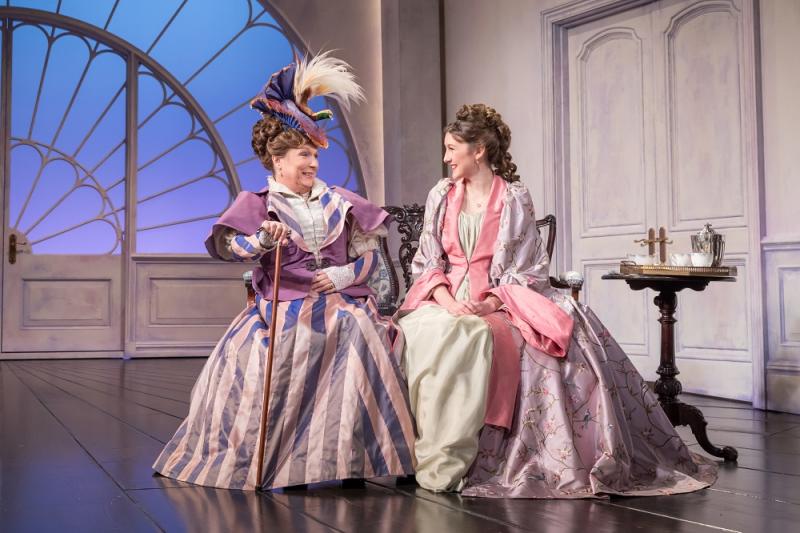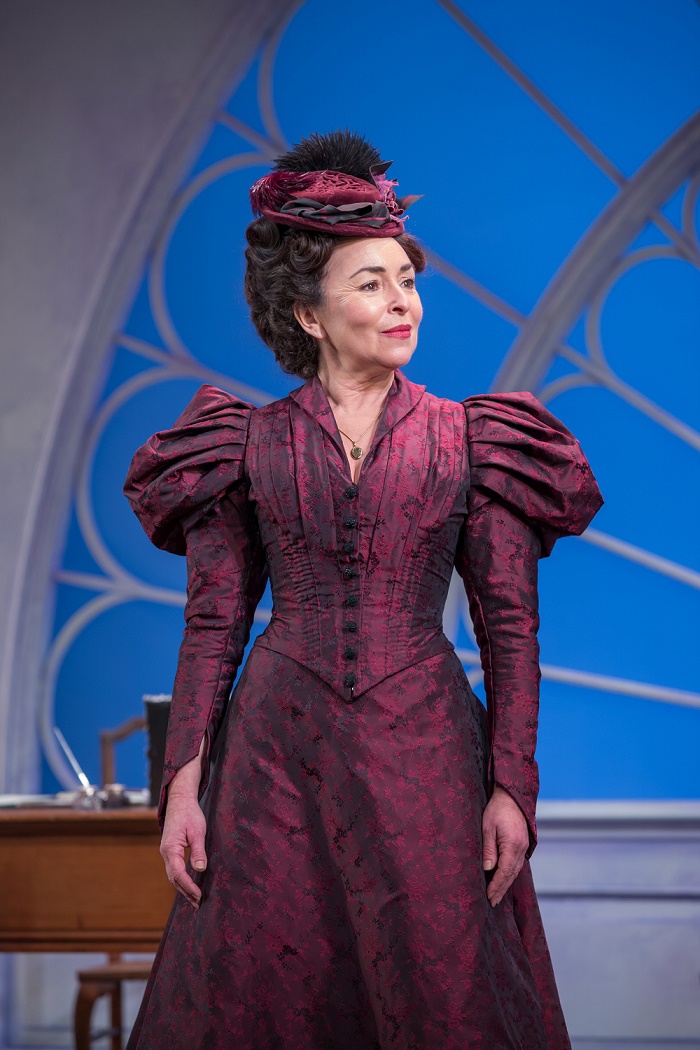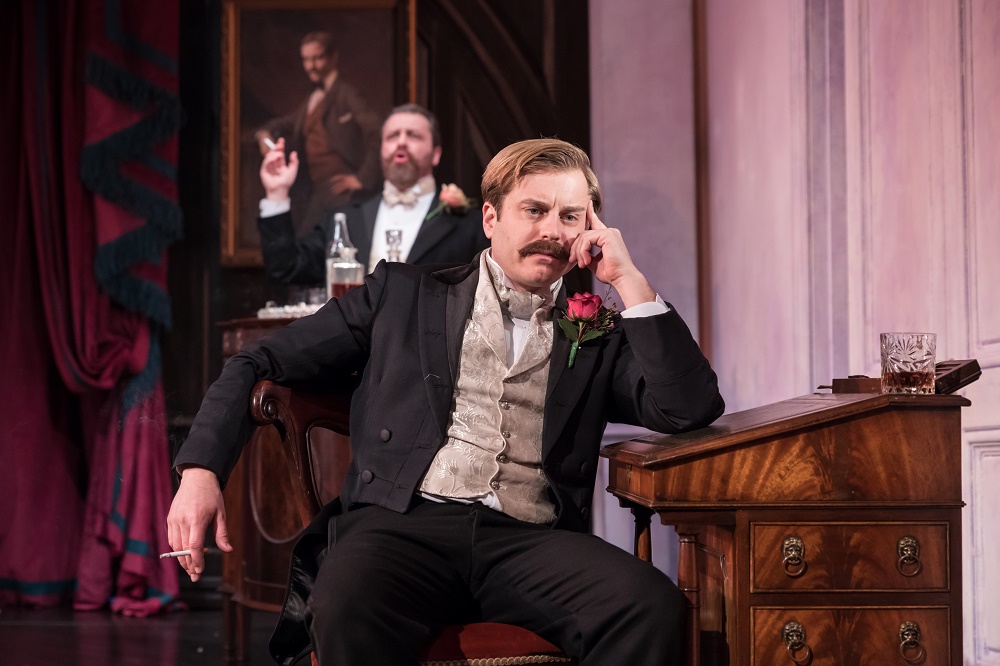Lady Windermere's Fan, Vaudeville Theatre review - Wilde abandoned | reviews, news & interviews
Lady Windermere's Fan, Vaudeville Theatre review - Wilde abandoned
Lady Windermere's Fan, Vaudeville Theatre review - Wilde abandoned
Jennifer Saunders gets laughs, but Kathy Burke's lamentable production misses the point

Imagine, if you will, discovering a ninth-rate old melodrama about upper-class nonsense, hiring a bunch of actors including a couple of starry friends big in comedy and putting it on stage. And then realising there’s a paying audience so, to make it work, they’re going to have to ham it up to the hilt… Hang on a minute, Oscar Wilde’s Lady Windermere’s Fan isn’t ninth-rate melodrama.
Three years (and four plays) before he was notoriously dragged through the mud, Wilde was already writing about reputation and sacrifice. Young Lady Windermere (Grace Molony), who admits to having “something of the Puritan in me”, sees things starkly in terms of right and wrong and will “allow of no compromise”. Yet she promptly finds herself compromised twice over. First of all, the self-satisfied Duchess of Berwick (Jennifer Saunders) drops by to “sympathise” with her over the ghastly talk of the town: Lord Windermere’s affair with the vulgar Mrs Erlynne (Samantha Spiro, pictured below). Secondly, when, horrified by this dishonour, she finds herself abandoning him as she runs to her friend Lord Darlington (Kevin Bishop) who loves her.
 What she doesn’t know is the true reason for the seemingly disreputable connection between her husband and Mrs Erlynne, a circumstance derived from and engendering far more emotional upheaval than a mere affair. Emotions are gradually uncovered to the point of acts of desperation being considered by both women.
What she doesn’t know is the true reason for the seemingly disreputable connection between her husband and Mrs Erlynne, a circumstance derived from and engendering far more emotional upheaval than a mere affair. Emotions are gradually uncovered to the point of acts of desperation being considered by both women.
This is a play bound up in the rights and wrongs of appearance entirely predicated on rigid late-Victorian notions of status and, above all, class. In 2018 it is entirely legitimate to point out how stultifying those are, but for that viewpoint to appal the audience, the play’s concerns have to be given due seriousness and weight.
Burke makes the mistake of spotting and underlining the melodrama while failing to see that Wilde uses that merely as a springboard. His trick was then to use epigrams and verbal extravagance to say serious things. But Burke treats his lines like set-dressing, embellishments, when they are, in fact, the meat of the play embodying, as in Alice in Wonderland, the difference between meaning what you say and saying what you mean. He was being flippant about serious things. The only serious thing about this production is how badly he and audiences are being served.
Going into battle in the most extravagant costume and millinery, Saunders is in line for the John Lewis Award for being Never Knowingly Underplayed, but at least she’s on the money in terms of hauteur and rank which is more than can be said for the vast majority of the rest of the company, almost all of whom are miscast.
Instead of being principled but misguided, Molony’s Lady Windermere appears brittle and priggish. Molony is, however, constrained by the performances around her. Bishop (pictured below), who recently brought precision and energy to the otherwise disappointing Once in a Lifetime at the Young Vic, resorts to sub-Harry-Enfield posh and jolly when he needs to be winningly debonair for us to take their potential relationship seriously. Like almost all the men, he’s effortful when he should be easeful. Even the production’s presentation of class is off. The (invented) brazen insolence of the manservant and the maid gets the actors laughs but would more likely get their characters the sack. It makes Downton Abbey look like documentary realism. Having almost everyone play one-dimensional caricatures flattens the dramatic stakes and robs the play of depth. Burke encourages us to laugh at rather than with these characters so, when the revelations come, there’s absolutely no sense of having our opinions of them overturned. Yet this is a play in which a mother finally meets the child she abandoned 20 years ago. Ironically, for such a talky play, the real pain derives from feelings and facts that cannot be spoken about. There should be real emotional heft and, when directed and played well, the scenes of forbearance, misunderstanding and renunciation between them tear at the heart. But despite Samantha Spiro’s determinedly high-spirited work as Mrs Erlynne, her performance is never allowed to breathe so the only emotion elicited is sorrow that so strong an actor should be stranded in the wrong production.
Having almost everyone play one-dimensional caricatures flattens the dramatic stakes and robs the play of depth. Burke encourages us to laugh at rather than with these characters so, when the revelations come, there’s absolutely no sense of having our opinions of them overturned. Yet this is a play in which a mother finally meets the child she abandoned 20 years ago. Ironically, for such a talky play, the real pain derives from feelings and facts that cannot be spoken about. There should be real emotional heft and, when directed and played well, the scenes of forbearance, misunderstanding and renunciation between them tear at the heart. But despite Samantha Spiro’s determinedly high-spirited work as Mrs Erlynne, her performance is never allowed to breathe so the only emotion elicited is sorrow that so strong an actor should be stranded in the wrong production.
It’s hard to decide which is the production’s nadir: the adding of a “naughty” song sung at the footlights to cover a scene change and to beef up Saunders’s cameo role thereby completely wrecking any dramatic flow; or the “comic” moment when Lord Darlington crosses the stage to stand in front of his own portrait in – hold my sides – the same pose as the painting.
If you want to pay between £19.50 and £75 for what amounts to added extras, don’t let me stop you. But if you want to get any sense of what Wilde was really doing with the play, stay home and read it: It’s online. And it’s free.
The future of Arts Journalism
You can stop theartsdesk.com closing!
We urgently need financing to survive. Our fundraising drive has thus far raised £33,000 but we need to reach £100,000 or we will be forced to close. Please contribute here: https://gofund.me/c3f6033d
And if you can forward this information to anyone who might assist, we’d be grateful.

Subscribe to theartsdesk.com
Thank you for continuing to read our work on theartsdesk.com. For unlimited access to every article in its entirety, including our archive of more than 15,000 pieces, we're asking for £5 per month or £40 per year. We feel it's a very good deal, and hope you do too.
To take a subscription now simply click here.
And if you're looking for that extra gift for a friend or family member, why not treat them to a theartsdesk.com gift subscription?
more Theatre
 Elephant, Menier Chocolate Factory review - subtle, humorous exploration of racial identity and music
Story of self-discovery through playing the piano resounds in Anoushka Lucas's solo show
Elephant, Menier Chocolate Factory review - subtle, humorous exploration of racial identity and music
Story of self-discovery through playing the piano resounds in Anoushka Lucas's solo show
 This is My Family, Southwark Playhouse - London debut of 2013 Sheffield hit is feeling its age
Relatable or stereotyped - that's for you to decide
This is My Family, Southwark Playhouse - London debut of 2013 Sheffield hit is feeling its age
Relatable or stereotyped - that's for you to decide
 The Frogs, Southwark Playhouse review - great songs save updated Aristophanes comedy
Tone never settles, but Sondheim's genius carries the day
The Frogs, Southwark Playhouse review - great songs save updated Aristophanes comedy
Tone never settles, but Sondheim's genius carries the day
 Mrs Warren's Profession, Garrick Theatre review - mother-daughter showdown keeps it in the family
Shaw's once-shocking play pairs Imelda Staunton with her real-life daughter
Mrs Warren's Profession, Garrick Theatre review - mother-daughter showdown keeps it in the family
Shaw's once-shocking play pairs Imelda Staunton with her real-life daughter
 The Crucible, Shakespeare's Globe review - stirring account of paranoia and prejudice
Ince's fidelity to the language allows every nuance to be exposed
The Crucible, Shakespeare's Globe review - stirring account of paranoia and prejudice
Ince's fidelity to the language allows every nuance to be exposed
 The Fifth Step, Soho Place review - wickedly funny two-hander about defeating alcoholism
David Ireland pits a sober AA sponsor against a livewire drinker, with engaging results
The Fifth Step, Soho Place review - wickedly funny two-hander about defeating alcoholism
David Ireland pits a sober AA sponsor against a livewire drinker, with engaging results
 The Deep Blue Sea, Theatre Royal Haymarket review - Tamsin Greig honours Terence Rattigan
The 1952 classic lives to see another day in notably name-heavy revival
The Deep Blue Sea, Theatre Royal Haymarket review - Tamsin Greig honours Terence Rattigan
The 1952 classic lives to see another day in notably name-heavy revival
 The Brightening Air, Old Vic review - Chekhov jostles Conor McPherson in writer-director's latest
The Irishman's first new play in over a decade is engaging but overstuffed
The Brightening Air, Old Vic review - Chekhov jostles Conor McPherson in writer-director's latest
The Irishman's first new play in over a decade is engaging but overstuffed
 1536, Almeida Theatre review - fast and furious portrayal of women in Henry VIII's England
This wild, intelligent play is a tour de force till the doom-laden finale
1536, Almeida Theatre review - fast and furious portrayal of women in Henry VIII's England
This wild, intelligent play is a tour de force till the doom-laden finale
 The Comedy About Spies, Noel Coward Theatre review - 'Goes Wrong' team hit the spot again
More mayhem from the Mischief company
The Comedy About Spies, Noel Coward Theatre review - 'Goes Wrong' team hit the spot again
More mayhem from the Mischief company
 House of Games, Hampstead Theatre review - adapted Mamet screenplay entertains but is defanged
Richard Bean has turned Mamet's steel trap into an amusing puzzle
House of Games, Hampstead Theatre review - adapted Mamet screenplay entertains but is defanged
Richard Bean has turned Mamet's steel trap into an amusing puzzle
 Here We Are, National Theatre review - Sondheim's sensational swan song
The late composer bids farewell with a show made-to-order for now
Here We Are, National Theatre review - Sondheim's sensational swan song
The late composer bids farewell with a show made-to-order for now

Add comment